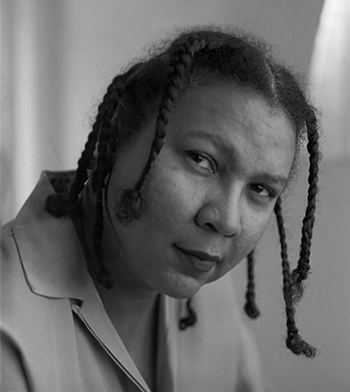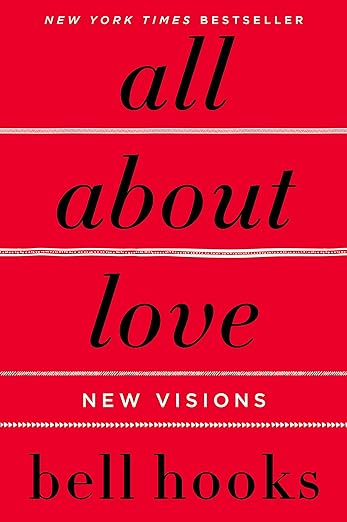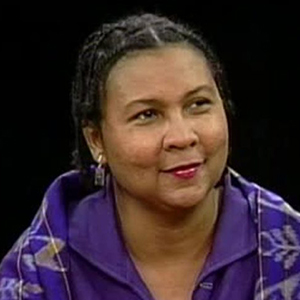“The word ‘love’ is most often defined as a noun, yet we would all love better if we used it as a verb.” – bell hooks from All About Love: New Visions

In All About Love: New Visions the brilliant feminist scholar, bell hooks, explores the ways that sexism, classism, racism, and capitalism have limited our capacity to love each other. Offering a rich mixture of theory and personal stories, she urges us to use radical love to transform every aspect of our society.
Now, three years after her death, in a world where loneliness is an epidemic and everything seems to be falling apart, her ideas about love seem to be gaining traction.
About bell hooks
A trailblazing cultural critic, bell hooks (1952 -2021) wrote over 30 books including literary criticism, children’s fiction, memoir, and poetry. She used the pen name “bell hooks” in honor of her maternal great-grandmother, and she insisted on spelling it with lower case letters because she wanted people to “focus on the substance of the books, not who I am.” All About Love: New Visions is the first book in her trilogy, Love Song to a Nation.
She was a visionary thinker, and it has taken the public a while to catch up with her. All About Love: New Visions came out in 2000, but it did not hit the New York Times best-seller list until 2021 – more than two decades after its original publication. Here in the San Francisco Bay Area, the book was a number one best seller for non-fiction paperbacks last month and it remains in the top ten this month.
Love As A Verb – Not A Noun
“All the great movements for social justice in our society have strongly emphasized a love ethic.” – bell hooks, All About Love, Introduction
Part of the appeal of the book is the refreshing clarity of the definition of love that hooks introduces in the first chapter and refers to throughout the book. For her, love is a verb, not a noun. It is something we do, not something that happens to us. Love is an active choice – a commitment to nurture our own or someone else’s spiritual health.

She explains that when we think of love as a conscious choice, we can take charge of our lives and take responsibility for creating love not only with a partner, but also in our friendships, families, communities, and the world at large.
On the other hand, if we accept the limited traditional idea that love is something that we have to fall into or that will happen to us by chance, we can waste our lives passively waiting for a perfect partner who may never show up.
Throughout the book, hooks shows that we need to choose conscious love in all aspects of our lives if we want to get the world back on track. We need to love the people around us, and we need to love the values that sustain our communities like justice, honesty, and compassion. Like many other activists and spiritual leaders, hooks sees love as the only effective way to break our current endless cycles of domination and violence.
Finding Our Strength as Women Artists
“Self-acceptance is hard for many of us. There is a voice inside that is constantly judging, first ourselves and then others. . . Because we have learned to believe that negativity is more realistic, it appears more real than any positive voice. . . . Far from being realistic, negative thinking is absolutely disenabling” – bell hooks, All About Love, Chapter 4

Since hooks was a woman artist herself, she was keenly aware of the fact that male gate-keepers shape our arts and media. They relentlessly promote stories about death and destruction, and they accuse women of being weak and irrational when we speak about the power of love. They want to persuade people that violence is normal and love is not, but in fact, the opposite is true.
As women artists, we need a lot of inner strength to challenge these violent norms and find ways to create different stories. How do we fortify ourselves? We need to start with self-acceptance and learning to trust ourselves and the people around us. Specifically, hooks says that we need to fight the negative internal voices that so often distract us from positive action.
Building Community
“We can begin the process of community wherever we are. We can begin by sharing a smile, a warm greeting, a bit of conversation; by doing a kind deed or by acknowledging kindness offered to us.” bell hooks, All About Love, Chapter 8
It is easy to look at the news these days and feel discouraged. But we have to remember that as women artists, we have the power to imagine a better world, and we have a global community of sisters to help us.
At WomenArts, we know that women artists can accomplish great things when we work together and cheer each other on. We have seen it happen thousands of times, and these experiences have given us hope. hooks devotes an entire chapter to the importance of community-building, and we share her beliefs.
The growing popularity of All About Love: New Visions shows that sometimes it takes decades for bold new ideas to take root, but we can’t let that stop us. As women artists, we have the skills to put inspiring new visions forward, and we can work on building supportive communities to share them.
That is what bell hooks did. Now it is up to us to follow her example.
